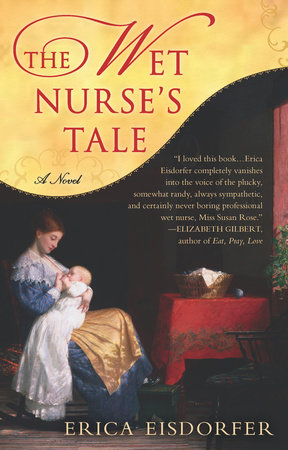READERS GUIDE
Questions and Topics for Discussion
INTRODUCTION
Susan Rose, like many lower-class women of Victorian England, she was born into a world that offered very few opportunities for the poor and unlovely. But Susan is the kind of plucky heroine who seeks her fortune, and finds it…with some help from, well, her breasts. Susan, you see, is a professional wet nurse; she breastfeeds the children of wealthy women who can’t, or won’t nurse their own babies.
Herself the daughter of a wet nurse, Susan first finds work as a maid at the local manor house. After a number of willing scullery-floor encounters with the master’s son, Susan becomes pregnant. Once her son is born, however, Susan realizes, as her mother did, that nursing the children of the rich will bring more money and security than sweeping and dusting at the manor. She leaves home to become a live-in wet nurse, working first in one house, and then another, always learning more about each family than they would probably like. But her own child is sold by her father when Susan is away, and sent to be fostered by a London lady who had lost her own baby. Determined to recover her son, Susan manages to convince his new mother, Mrs. Norval, to hire her as a wet nurse. But once reunited with her son, Susan finds the Norval home to be a much more sinister place than she’d ever expected. Dark and full of secrets, its master is in India, and its servants frightened by the mistress, for Mrs. Norval is a deeply disturbed woman, and the first baby who died in her home did so under very mysterious circumstances. Susan embarks on a terrifying scheme to rescue her son before he can meet the same fate.
ABOUT ERICA EISDORFERErica Eisdorfer was born and raised in Durham, North Carolina, and graduated from Duke University. She was the book reviewer for WUNC, an NPR affiliate, for eight years. Eisdorfer has managed the Bull’s Head Bookshop, the trade bookstore on the campus of the University of North Carolina at Chapel Hill, for twenty years. She lives in Carrboro with her husband and two daughters.
DISCUSSION QUESTIONS“I was always a good girl.” Susan asserts at the start of the novel. Do you believe this? Does following Susan’s adventures throughout the book change your opinion?How did her sister Ellen’s death affect Susan? Had she not died the way she did, do you think Susan’s life would have gone down a different path?Susan defends her affair with Master Freddie, saying “Master Freddie is not a bad man. He took advantage, yes he did. And he was wrong to do it. If I’m to be honest, though, I must confess the whole of it and that’s that I let him, didn’t I.” Do you think this is true? What do you make of Susan’s relationship with Freddie, both at the beginning and later in the novel?When Susan’s first son, Joey, dies, the family whose child she’s nursing gives her a gift out of guilt. Susan says “I thanked him kindly for the gift, but did not think it was enough, considering.” Is she being mercenary or sarcastic, or merely practical? Do you think she blames herself for the death of her son? Should she also blame the family she was working for?To what extent does Susan have to repress her emotions in order to make a living as a wet nurse? Does it seem to you like an emotionally rewarding job or a distressing one?How do the voices of the other narrators—the “customers” of Mrs. Rose, Susan’s mother—round out the story of wet-nursing as a profession? Which ones affected you most and why?When Susan is raped by the coach driver and makes a deal to exchange sex for his taking her to London, she says “After I understood how to make him do as I wished, it mattered to me not at all to do as he wished. It cost me but little.” Is this another example of Susan’s ruthless practicality? What does this episode say about Susan’s attitude towards sex itself? What does it say about the times she lived in?When Susan schemes to get her son back from Mrs. Norval she justifies herself saying: “I would not shrink from any horrid thing at all in my mission.” Does she actually do anything “horrid”? Do you believe Susan has any pity towards the obviously ill Mrs. Norval or is her kindly treatment of the lady purely manipulative?Would Mr. Brooks have been so quick to give David back to Susan if he had been from a rich home instead of “but a foundling?” Was he motivated purely by concern for the baby, or a desire to wash his hands of the situation? In what ways is his sending David off with Susan a reflection of the class divide in Victorian England?Do you think Susan will be happy in the Jewish community? Why would she prefer to find a home there instead of returning to her mother’s home in Leighton? Will she and Harry live happily ever after? What do you think is the next chapter in Susan’s tale?

